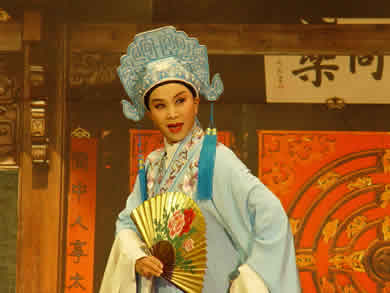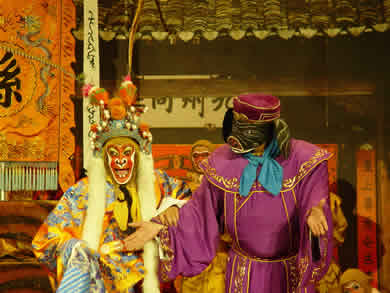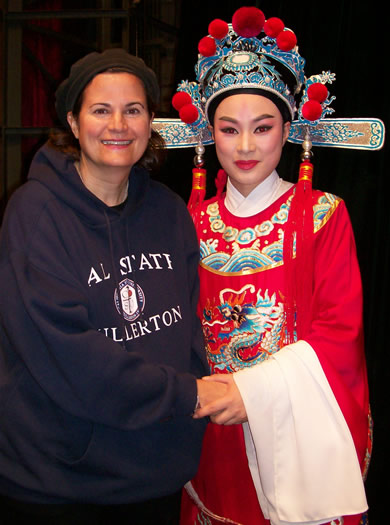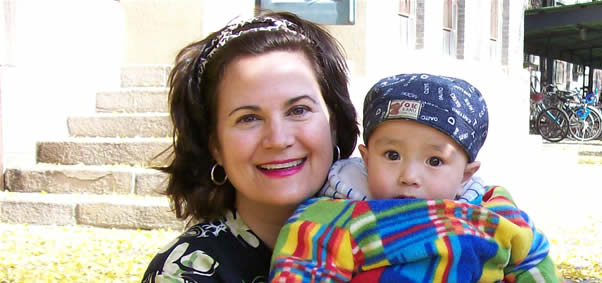Experiencing China Through Its Opera
Lesson Seven in Snow’s Job in China
November 5, 2007
By Nancy Snow
Nancy Snow, associate professor of communications, is a visiting senior scholar and professor in Beijing, China, through November. She is teaching a graduate course in public diplomacy at Tsinghua University’s School of Journalism and Communication, as well as working on joint research projects with Chinese faculty. While overseas, she will be sharing her experiences.
Lesson Six: When in China, get your opera on.
Puttin’ on the Ritz means to enjoy different styles of opera, which number here around 350, with many styles of costumes, dialects, music and narratives. I’m not much of an opera fan in the United States but here I couldn’t resist.
In mid-October, Tsinghua University hosted a company to help encourage young people (black-haired) to appreciate opera as much as their white-haired older counterparts. There were a lot of older people in the audience but happily a lot of students, too. I was singled out by the head of the Beijing Opera Association. He must have noticed my Western face in the audience. I was asked to answer what I knew about Beijing Opera. I said, “I’m from America and Beijing Opera is world famous. I’m excited to be here.” He said in Chinese, “You won’t be disappointed.” Boy, was he right.
Beijing Opera is a wonderful mix of Chinese cultural tradition, including martial arts, singing, musical instrument playing and elaborate dress and make-up. The three-act performances we watched were classics. The performances included: a comedic waiter, distinguished by a white stripe on the nose, and a 24-year-old martial arts expert who has been training in Beijing Opera since he was 4; women playing male judges with long, black beards and blackface (signifying justice); and men in women’s costumes portraying very feminine women in whiteface and bright red lipstick. I loved all the gender bending, hoping it may help to build sensitivity between the sexes.

I was mesmerized by the incredible discipline, even among the small characters that just stand like statues in the background. The instruments played were very traditional. Since I’m no expert in Beijing Opera, I wouldn’t be able to name all the instruments but the sound was wonderful — from very haunting at times and at other times, right in sync with the mood of the scene.
Once the music began I was transfixed. Beijing Opera is known for very simple staging. The stage in the first scene was very sparsely furnished with just a small table. But it didn’t matter that there was no scenery to set the mood. The actors themselves are triple threats (like Britney would like to be) and they make the show. Out bounded the young martial arts expert in elaborate costume and make-up. Within a few minutes he was engaged in a sword fight dance with the waiter. The level of athleticism and training that prepares these actors often begins in childhood. They train for years to make their acrobatic movements absolutely precise, flawless and seemingly effortless to do. I guarantee you that by the end of the show the two actors were drenched with sweat.
After the show I read up on Beijing Opera, which is defined primarily by two musical types: (1) Wuchang, which consists of a number of percussion instruments such as wooden clappers, cymbals, gongs and drums that emphasize the quick cut body movements of the actors; and (2) Wenchang, which includes the Chinese two-string fiddle or violin (erhu), horns and flutes. There is so much to the music alone that captures the senses but then one adds color.
The color of the make-up tells you the story in part, even if you don’t know Mandarin (my predicament). Red signifies a loyal or brave person, white is treachery, yellow is a symbol of brutality, and blue often signifies bandits while gold and silver corresponds with ghosts. Black is a sign of integrity and fierceness. Since there are over 1,000 different color combinations, I’ll move on to the next observation....
The voices of the actors are an acquired taste. Many young Chinese don’t go for the nasally and often high-pitched shrills that accompany the character personality types but I loved the sounds and appreciated the incredible training that must go into disciplining one’s voice to such a dramatic pitch. When I was mimicking the falsetto sound of these voices for one Chinese student, she asked that I make sure the American people know that the Chinese don’t really talk like that. This is true. The voices of the actors are a combination of dramatic speaking to the audience followed by some gorgeous singing.

The most famous operatic film is “Farewell My Concubine,” said to be inspired by the life of Mei Lanfang, the famous female impersonator who popularized Beijing Opera in the West. Time magazine named the 1993 film one of the 100 all-time best films. Mei Lanfang (1894-1961) received an honorary doctorate in letters from the University of Southern California.
What I loved of the whole experience of Beijing Opera was the movement and gesturing of the actors. Many, but not all, of the female roles are played by men, and their feminine aura, including the precise turn of the hand and flip of their water sleeves (oversized sleeves that are touched to signify sorrow or respect), suggest a womanliness that is hard to find even among natural-born women. I could take a tip or two from these guys in using one’s feminine wiles to better communicate!

Nancy with one of the opera stars (notice the water sleeves)
After the show I approached a young man who was snapping a lot of photos during the program. He kindly sent me a slideshow of the evening and I’m including a number of his photos here of many of my favorite characters, including Monkey King. Thanks to Yang Xiao Peng, Department of Materials and Science, Tsinghua University, for his good photography and lifelong memories.
Nancy Snow’s email address is nsnow@fullerton.edu.


